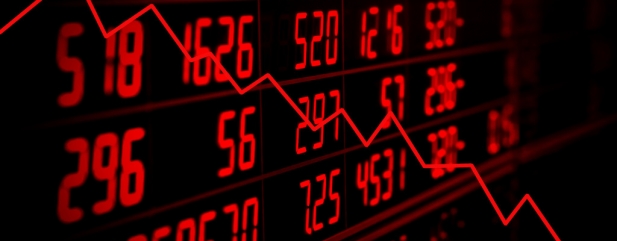Archived article
Please note that tax, investment, pension and ISA rules can change and the information and any views contained in this article may now be inaccurate.
Why stock markets have taken a battering this week

Markets around the world have had a torrid time in the past week, with major sell-offs in the UK, US, European and Asian markets.
Any daily movement one way or the other over 1.5% is generally considered significant in stock markets, and so far in August the FTSE 100 has fallen from close to 7,700 to hovering below the 7,200 mark with 2% daily plunges a feature.
SO WHAT'S GOING ON?
In the FTSE 100 with its many international-facing companies, big macroeconomic news can have a significant impact, particularly when it involves the two largest economies in the world – the United States and China.
As the US and China start getting angrier with each other, investors are getting increasingly scared and selling off shares in companies they think will be impacted by the trade war. As we write it’s estimated that global stock markets are down 4% from last week.
The mining and energy sectors have been a big drag on the index’s performance as China is a major buyer of metals and oil. So if trade tensions affect the Chinese economy, demand for commodities could fall.
The big trigger in all of this has been US president Donald Trump’s surprise announcement of a 10% tariff on $300bn of Chinese goods, which means all Chinese imports are now effectively taxed.
China has since hit back, allowing its currency to weaken, which has prompted a further escalation with the US outright labelling China a currency manipulator.
Such a move is seen as a big no no in diplomatic relations, and is the first time any country has officially been called a currency manipulator since 1994, when the US last called out China.
By letting the value of the yuan go below seven to the dollar as it has done, China is taking a carefully calculated gamble that it can use its currency to soften the blow from tariffs without worrying investors so much they take their money out of the market.
Trump has previously complained that a weaker yuan puts the US ‘at a disadvantage’. Because China’s currency is weaker, it means foreign companies can import Chinese goods at a cheaper price, potentially choosing them over American goods.
China can therefore cushion the blow by getting more money from exports. But the move is not without risks, as imports will become more expensive and it has the potential to drive up inflation – not good when the country is already facing a slowing economy.
Kerstin Braun, president of Stenn, an international supplier of trade finance headquartered in London, says: ‘We can confidently say that a global recession is on the horizon if both yuan stays at this level and tariffs remain for four to six months.’
Important information:
These articles are provided by Shares magazine which is published by AJ Bell Media, a part of AJ Bell. Shares is not written by AJ Bell.
Shares is provided for your general information and use and is not a personal recommendation to invest. It is not intended to be relied upon by you in making or not making any investment decisions. The investments referred to in these articles will not be suitable for all investors. If in doubt please seek appropriate independent financial advice.
Investors acting on the information in these articles do so at their own risk and AJ Bell Media and its staff do not accept liability for losses suffered by investors as a result of their investment decisions.
 magazine
magazine









